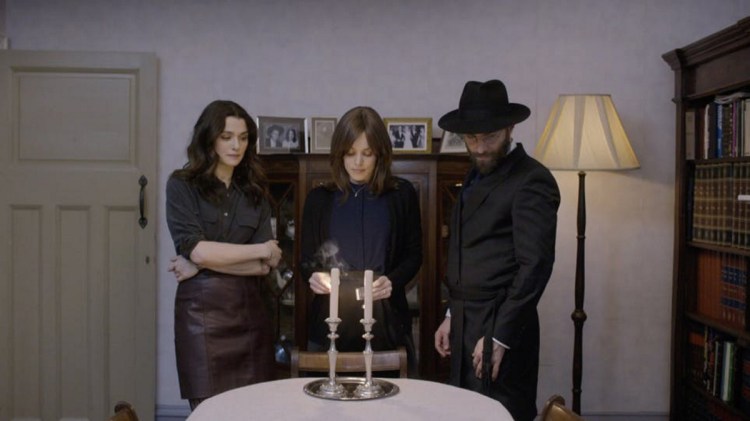Chilean filmmaker Sebastian Lelio loves women and treats them with honesty and respect, especially the most fragile with troubled lives, past and present.
Lelio, who took an Oscar home for his “A Fantastic Woman,” brings to our screens this week “Disobedience,” a story of memory, displacement, religion and sex, a full menu of trouble.
The ever wonderful and smokey eyed Rachel Weisz is here as Ronit, a British expatriate living and working as a New York photographer.
We first meet her as she’s shooting a magazine layout in her Manhattan studio. She smiles and is warm with her subjects, but there is that dark thing in her eyes as thin as cigarette smoke.
There is a phone call from London, never a good sign, with the news that her father, a much loved elderly British Orthodox rabbi, has died.
There seems to be nothing in the call that says come home at once, or even at all, just a “thought you’d like to know,” and have a good day. She’s not surprised at that; along the way all will be revealed.
Ronit arrives in London and cabs to her father’s house in Hendon, the strict Orthodox neighborhood where she grew up and where the ancient dust of orthodoxy floats in the autumn air.
She is greeted at the door by her uncle who seems stunned that she has come — also not a good sign.
Ronit’s sudden presence among the black suits and grey faces sitting Shiva in the parlor throws a cloak of shared silence around the room.
She is greeted — not touched, just tepidly greeted — by her childhood friend, Dovid (Alessandro Nivola) whom we learn is her father’s anointed successor to head the congregation.
Dovid, now a teacher at the Yeshiva, has acquired all of the chilly reserve and discipline that that role commands. But there is love remembered in his smile.
At the wake, Esti (Rachel McAdams), Ronit’s long ago best friend, enters the room and the movie begins when Ronit learns that Esti and Dovid are married.
In the next few scenes we learn that in their late teen years, something that once happened and that has lain dormant between these two young girls has returned and clearly will not be avoided.
Whatever happened on that distant day, the vibrations became so audible and undeniable that it caught the attention of their elders. Ronit, the oldest of the two, was branded and shunned, and eventually left for America.
Scene after scene the pressure builds and finally Ronit persuades Esti to join her on a subway ride out of the neighborhood to a West End hotel where a vivid and pulsating act of love is so intensely performed it takes three more scenes to get over it.
In the final scenes, when it’s clear that both women have a life changing decision to make, three important moments occur. The most beautiful of these is a physical gesture by Dovid that tears at the heart.
The work of all three major players is among the best I’ve seen, and the two Rachels play it out.
The great Weisz of course, always comes to her roles with some kind of preternatural algorithm. It’s a wonder to watch.
Rachel McAdams fluffy and light and wasted in “Wedding Crashers” and “Midnight in Paris,” arrives here with more maturity and depth. She holds her own next to Weisz, who said she would not have done the film without McAdams.
Alessandro Nivola, (“American Hustle”) gives us a soft and uncertain Dovid who in the end becomes his own man, and handles his one great moment like a pro.
This is Sebastian Lelio’s first film in English and leaves us waiting for his next choice.
Cinematographer Danny Cohen wastes not a moment, a breath of air or a single frame. His Jewish rituals of death and bereavement show deep study and stunning realism.
“Disobedience” — at last, a mature movie that shakes the screen.
J.P. Devine, of Waterville, is a former stage and film actor.
Send questions/comments to the editors.




Success. Please wait for the page to reload. If the page does not reload within 5 seconds, please refresh the page.
Enter your email and password to access comments.
Hi, to comment on stories you must . This profile is in addition to your subscription and website login.
Already have a commenting profile? .
Invalid username/password.
Please check your email to confirm and complete your registration.
Only subscribers are eligible to post comments. Please subscribe or login first for digital access. Here’s why.
Use the form below to reset your password. When you've submitted your account email, we will send an email with a reset code.